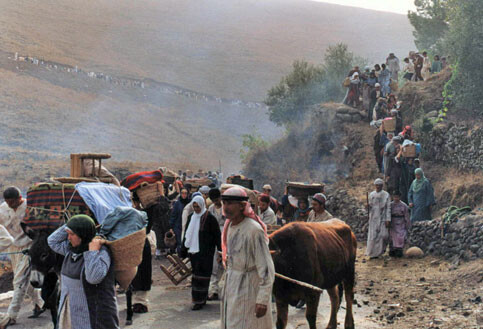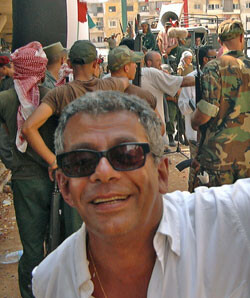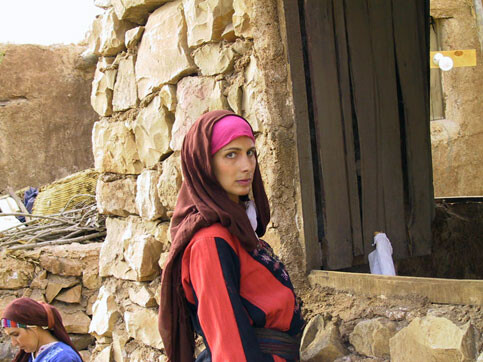The Electronic Intifada 17 April 2005

Nasrallah not only succeeds in his large-scale recreations of demanding passages in Palestinian history, but he infuses intimate scenes with a nuanced tenderness.
Bab el Shams (Door to the Sun) is the most recent cinematic achievement from Egyptian director Yousri Nasrallah. Adapted from the novel by Lebanese writer Elias Khoury, this ambitious film takes on the weighty goal of covering roughly fifty years of Palestinian history, from 1943 to 1994, and centers around the lives of a group of Palestinian refugees. Split into two parts: The Departure and the Return, Bab el Shams runs just under five hours, but do not let this sway you. While the length is epic-worthy, Bab el Shams is a tour de force, exposing complex storylines and individualized realities. Nasrallah not only succeeds in his large-scale recreations of demanding passages in Palestinian history, but he infuses intimate scenes with a nuanced tenderness. Told through memory and flashback, Palestinians in Bab el Shams are not just a cause but people whose undeniable will to continue is coupled with faults and weaknesses.

Director Yousri Nasrallah
However, this moment is fleeting as both of their lives tragically unhinge. Hours after Khalil’s girlfriend, Chams (Hala Omran) kills a man in cold blood, Younes is rushed to the hospital after suffering a stroke. The rest of the action is relayed mostly through flashbacks initiated by the conversations between Khalil and Om-Hassan at Younes’ bedside over the course of almost seven months. While Khalil, who has sought refuge from the authorities at the hospital, begs Younes not to die because he still needs him, Om-Hassan recognizes that Younes is “no longer of this world.” Khalil takes on the role of the main narrator re-living Younes’ life as a freedom fighter for Palestine and recounting Younes’ love for his wife Nahila (Rim Turkhi). This non-linear style of filling in the plot provides interesting twists that slowly tie up loose ends, adding a complex layer of understanding to the characters motivations.
Flashing back to 1943 in Palestine, Khalil begins Younes’ story with the marriage of the “young kid who fought the British in the hills” to an even younger short-haired Nahila. Tension grows as Khalil leaves the next morning to fight and Nahila, whose mother and sisters have moved to work in Tarshiha, is left alone to toil for Younes’ severe mother. But Nahila is one of the most endearing characters in Bab el Shams, and is endowed with tremendous strength. Throughout the film she struggles against the acceptable role of women in Palestinian society: learning to read and recite poetry from Sheik Ibrahim (Muhtaseb Aref), leading a march of women to return to their village when they are driven from their homes, and standing up defiantly to the authorities when questioned on her husband’s whereabouts.
Making for some of the most amazing and heart-wrenching cinematic moments are the scenes of the Palestinian expulsion from their land by the Israelis. Beginning with the nighttime attack on Ain El Zeitoun on May 15, 1948, Nassrallah does not hesitate at the enormity of the task. As the village is set aflame a load speaker resounds, “This is a non-Arab zone” which almost unbearably repeats throughout the first part of the film. After the young men are rounded up and shot, the survivors frantically leave their homes, desperately clinging to their children. A theme that will be repeated throughout the film is the fact that Younes was not there during the attack. Returning after a trip to Syria to get ammunition, he finds the destruction of his home and by chance reunites with his family.

Throughout the film Nahila struggles against the acceptable role of women in Palestinian society: learning to read and recite poetry, leading a march of women to return to their village when they are driven from their homes, and standing up defiantly to the authorities when questioned on her husband’s whereabouts.
Needless to say, as the refugees seek solace in Chaab, the first refugee camp, their dire situation gets worse. While the villagers are indurate and commit themselves to fight, the character of Lieutenant Mahdy, a member of the Arab rescue army, foreshadows the future. Almost hysterical he explains, “But why should they [the Israelis] pull out? We have no orders. Our leaders are negotiating.” Tragically, just as the refugees are hopeful and celebrate him, Mahdy commits suicide. Driven over and over from the land, Nahila and Sheik Ibrahim decide to stay in Palestine moving to Deir el Assad. Om-Hassan explains another side of the Palestinian reality as she tells her experience of walking for days and ending up in Lebanon. She reflects, “That day in the valley it was us here and Palestine there. No one understood a thing. No one wanted to move and then we went to Kana. We were told it was temporary. Maybe so but it still isn’t over.”
Tension builds between Khalil and Om-Hassan’s stories as Khalil focuses on the love of Younes and Nahila, and the years that Younes risked his life crossing the border to see his family and to spend time with his wife in the cave which they set up like a home, Bab el Shams. Om-Hassan rejects his interpretation and brings broader symbolism to their relationship: “Younes never loved Nahila…We didn’t know Palestine until we lost it! Younes loved Nahila only once they were separated!”
Part two ties up the loose ends from part one and fills in the story of Khalil and his girlfriend Chams. Not as compelling as the first two hours, part two is noteworthy for its tragic blurring and eventual disintegration of our understanding of characters, notably Khalil. Born in Chatila in Lebanon to Palestinian parents, Khalil was a child of the revolution who Younes takes as his son when Khalil’s father is killed and his mother abandons him. Trained as a fighter during the 1973 Lebanese war and later in 1977 in China, when an injury is discovered, Khalil studies medicine. In August of 1982 during the expulsion of the PLO from Beirut, he meets Chams. A femme fatale, Chams suffered as an abused and tortured wife and found her power through her increased involvement in the PLO. When she fights violence with violence, her fate is sealed and Khalil’s truthfulness as a narrator is exposed.
One performance worth mentioning is that of Selim Assaad (Maher Essam), a young Palestinian street-savvy scam artist who tries to breathe new life into Younes and inevitably Khalil. Perhaps symbolic of the resilience of the Palestinian people to “start from scratch,” Selim offers an interesting counter to Khalil. As the film continues we begin to lose trust in Khalil’s versions of events, but it does not take away from the power of Nassrallah’s achievement. Bab el Shams has deservedly received praise in the film community; it was selected by Cannes Film Festival to be part of its official, out of competition selections, and has been screened at film festivals worldwide. Do not miss the chance to watch this riveting film, which traverses fifty years of Palestinian history and is filled with love, life and an ongoing will to survive.
Jenny Gheith is a film critic for The Electronic Intifada.
Related Links:





